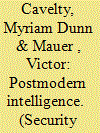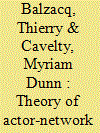|
|
|
Sort Order |
|
|
|
Items / Page
|
|
|
|
|
|
|
| Srl | Item |
| 1 |
ID:
081941


|
|
|
|
|
| Publication |
London, Routledge, 2008.
|
| Description |
ix, 182p.
|
| Series |
CSS studies in security and international relations
|
| Standard Number |
9780415429818
|
|
|
|
|
|
|
|
|
|
|
|
Copies: C:1/I:0,R:0,Q:0
Circulation
| Accession# | Call# | Current Location | Status | Policy | Location |
| 053572 | 005.8/CAV 053572 | Main | On Shelf | General | |
|
|
|
|
| 2 |
ID:
119482


|
|
|
|
|
| Publication |
2013.
|
| Summary/Abstract |
The link between cyberspace and national security is often presented as an unquestionable and uncontested "truth." However, there is nothing natural or given about this link: It had to be forged, argued, and accepted in the (security) political process. This article explores the constitutive effects of different threat representations in the broader cyber-security discourse. In contrast to previous work on the topic, the focus is not solely on discursive practices by "visible" elite actors, but also on how a variety of less visible actors inside and outside of government shape a reservoir of acceptable threat representations that influence everyday practices of cyber-security. Such an approach allows for a more nuanced understanding of the diverse ways in which cyber-security is presented as a national security issue and of the consequences of particular representations.
|
|
|
|
|
|
|
|
|
|
|
|
|
|
|
|
| 3 |
ID:
110837


|
|
|
|
|
| Publication |
2012.
|
| Summary/Abstract |
Aiming at the measurement, comparison and ranking of all kinds of public dangers, ranging from natural hazards to industrial risks and political perils, the preparation of national risk registers stands out as a novel and increasingly popular Western security practice. This article focuses on these registers and the analytical power politics in which they are complicit. We argue, first, that positing science as an objective determinant of security truth, national risk registers advance a modernist understanding of how knowledge of national dangers can be arrived at, discounting both sovereign and popular authorities; second, that by operationalizing a traditional risk-assessment formula, risk registers make possible seemingly apolitical decisions in security matters, taken on the basis of cost-benefit thinking; and, third, that risk registers' focus on risk 'themes' tiptoes around the definition of referent objects, avoiding overt decisions about the beneficiaries of particular security decisions. Taking all these factors into account, we find that risk registers 'depoliticize' national security debates while transforming national insecurity into something permanent and inevitable.
|
|
|
|
|
|
|
|
|
|
|
|
|
|
|
|
| 4 |
ID:
087451


|
|
|
|
|
| Publication |
2009.
|
| Summary/Abstract |
Providing strategic warning to policymakers is a key function of governmental intelligence organizations. Today, globally networked challenges increasingly overshadow their historical state-centric counterparts so that warning has become considerably more difficult. It is recognized in parts of the intelligence community that many of the current problems for warning arise from continued reliance on analytic tools, methodologies and processes that were appropriate to the static and hierarchical nature of the threat during the Cold War. However, even though alternative analysis techniques have begun to be applied, this article argues that the intelligence community could benefit from the understanding that more than just the ontology of threats has changed, that in fact it is in the epistemological area that the most meaningful changes have taken place: Society has seen the replacement of the previous means-end rationality by a reflexive rationality. The notion of reflexive security can provide a valuable conceptual framework for understanding the current changes, and it could be instrumental in adapting intelligence sources and methods to a new era. In particular, an awareness of both complexity sciences and postmodernism might increase understanding of the limitations of knowledge and lead to the establishment of a political discourse of uncertainty.
|
|
|
|
|
|
|
|
|
|
|
|
|
|
|
|
| 5 |
ID:
081922


|
|
|
|
|
| Publication |
Hampshire, Ashgate Publishing Limited, 2007.
|
| Description |
xiv, 165p.
|
| Standard Number |
9780754670889
|
|
|
|
|
|
|
|
|
|
|
|
Copies: C:1/I:0,R:0,Q:0
Circulation
| Accession# | Call# | Current Location | Status | Policy | Location |
| 053558 | 005.8/CAV 053558 | Main | On Shelf | General | |
|
|
|
|
| 6 |
ID:
137012


|
|
|
|
|
| Summary/Abstract |
Diverse, sometimes even contradictory concepts and practices of resilience have proliferated into a wide range of security policies. In introducing this special issue, we problematize and critically discuss how these forms of resilience change environments, create subjects, link temporalities, and redefine relations of security and insecurity. We show the increased attention – scholarly as well as political – given to resilience in recent times and provide a review of the state of critical security studies literature on resilience. We argue that to advance this discussion, resilience needs to be conceptualized and investigated in plural terms. We use temporalities and subjectivities as key analytical aspects to investigate the plural instantiations of resilience in actual political practice. These two issues – subjectivity and temporality – form the overall context for the special issue and are core themes for all the articles collected here.
|
|
|
|
|
|
|
|
|
|
|
|
|
|
|
|
| 7 |
ID:
099745


|
|
|
|
|
| Publication |
London, Routledge, 2010.
|
| Description |
xvi, 482p.
|
| Standard Number |
978071446361, hbk
|
|
|
|
|
|
|
|
|
|
|
|
Copies: C:1/I:0,R:1,Q:0
Circulation
| Accession# | Call# | Current Location | Status | Policy | Location |
| 055364 | 355.033/CAV 055364 | Main | On Shelf | Reference books | |
|
|
|
|
| 8 |
ID:
145672


|
|
|
|
|
| Summary/Abstract |
This article argues that some core tenets of Actor-Network Theory (ANT) can serve as heuristics for a better understanding of what the stakes of cyber-security are, how it operates, and how it fails. Despite the centrality of cyber-incidents in the cyber-security discourse, researchers have yet to understand their link to, and affects on politics. We close this gap by combining ANT insights with an empirical examination of a prominent cyber-incident (Stuxnet). We demonstrate that the disruptive practices of cyber-security caused by malicious software (malware), lie in their ability to actively perform three kinds of space (regions, networks, and fluids), each activating different types of political interventions. The article posits that the fluidity of malware challenges the consistency of networks and the sovereign boundaries set by regions, and paradoxically, leads to a forceful re-enactment of them. In this respect, the conceptualisation of fluidity as an overarching threat accounts for multiple policy responses and practices in cyber-security as well as attempts to (re-)establish territoriality and borders in the virtual realm. While this article concentrates on cyber-security, its underlying ambition is to indicate concretely how scholars can profitably engage ANT’s concepts and methodologies.
|
|
|
|
|
|
|
|
|
|
|
|
|
|
|
|
|
|
|
|
|